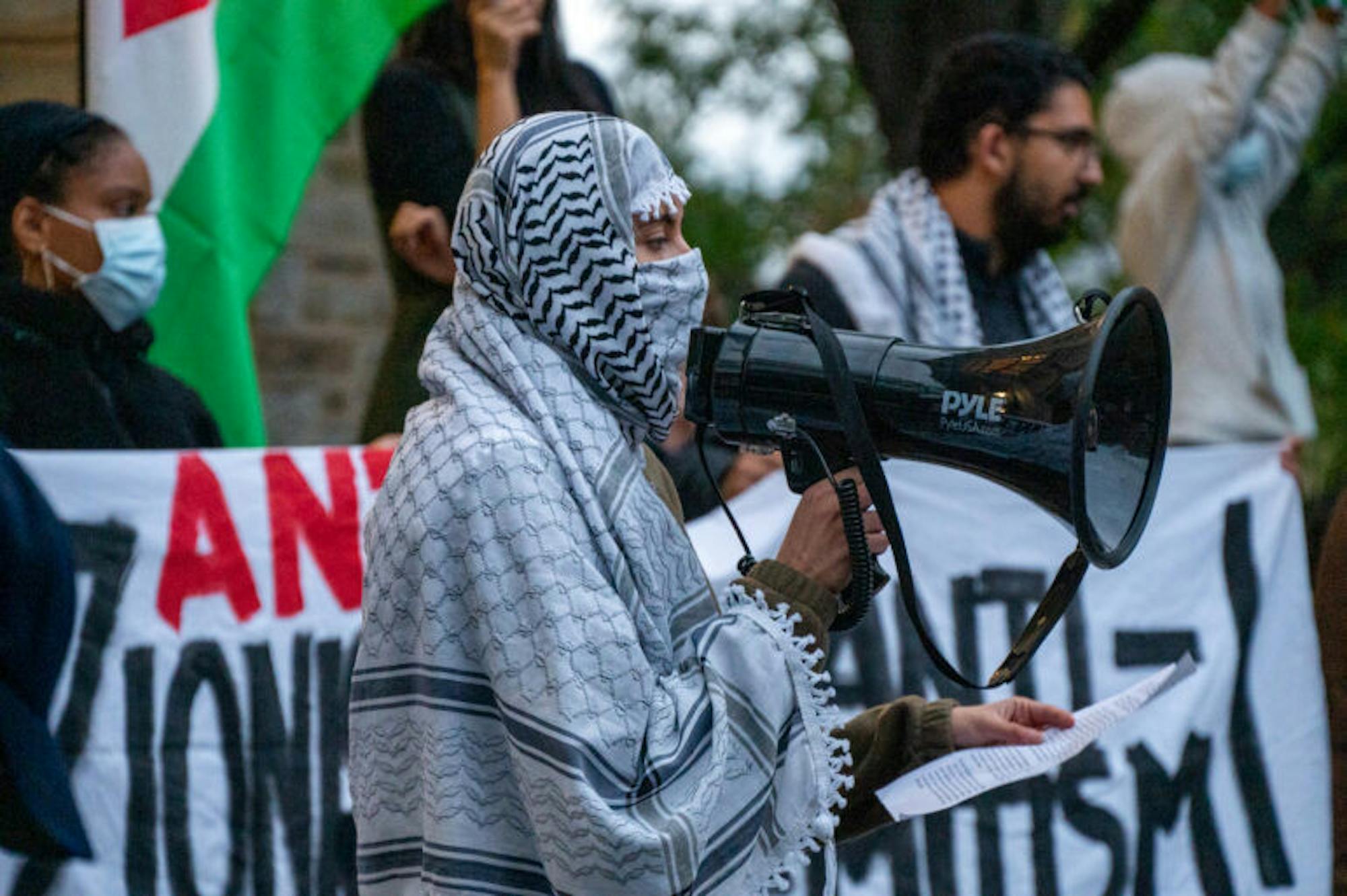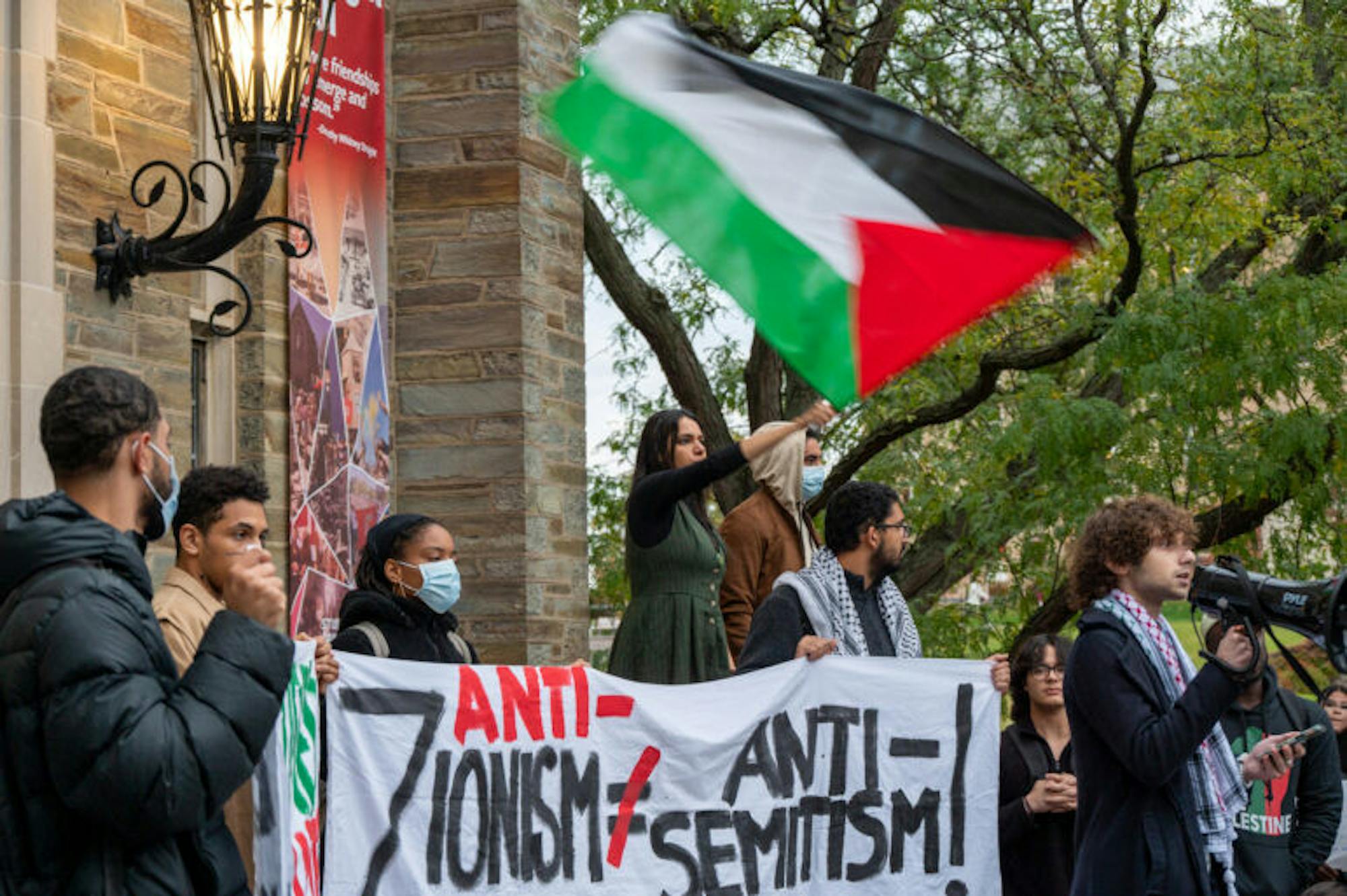“Free, free Palestine;” “From the river to the sea” and “No justice, no peace” were just a few of the chants that rang through Ho Plaza on Wednesday, Oct. 18. At 5 p.m., students, faculty and staff gathered at a rally hosted by Students for Justice in Palestine in solidarity with Palestinians impacted by the ongoing Israel-Hamas war.
Participants gathered at the entrance to Willard Straight Hall, carrying signs with phrases such as “We know occupation” and “End Apartheid, Free Palestine.” Some wore a keffiyeh, a traditional scarf that has become a key cultural symbol of Palestinian identity.
Before the rally began, Bianca Waked grad urged participants to beware of doxxing — the release of one’s personal information to the public without consent — which has been occurring among university students and activists that openly condemn Israel, including at Harvard University. Many participants donned surgical masks and face coverings to protect their identities.
The rally began with a reading of a revised statement from SJP which addressed President Martha Pollack’s updated statements on the war and Tuesday’s strike on Al-Ahli Arab hospital in Gaza that killed hundreds of Palestinians, many of which were seeking treatment following the start of Israeli air strikes on the Gaza strip, among other issues. Israeli and Palestinian officials are blaming each other for the strike, and U.S. and Israeli intelligence claim to have found Israel not responsible for the strike.
Following the reading came various emotional and passionate speeches from current and retired faculty members and students who condemned Israel for the violence against and death of Palestinians, along with the U.S. government’s support for Israel.
Speakers described the Israeli government’s acts as genocide and apartheid, the latter being consistent with the 2022 U.N. Special Rapporteur’sreport to the U.N. human rights council, as well as various human rights organizations including Amnesty International.
However, the United States House of Representatives passed a resolution this July stating, "The State of Israel is not a racist or apartheid state, Congress rejects all forms of antisemitism and xenophobia, and the United States will always be a staunch partner and supporter of Israel."

Speakers also pointed to the lack of support from the University, particularly regarding Pollack’s statements. They pointed to how, of the three statements, Palestinians were only briefly mentioned, with no mention of the humanitarian crisis in Gaza.
“I feel like Palestinian and Arab students in particular have felt unsupported on this campus. It definitely feels like our lives are worth less to this administration [and] to other students,” one Arab student told The Sun, who wished to remain anonymous.
Malak Abuhashim ’24, event planner of the Arab Student Association, addressed Pollack directly, speaking about the impact of trauma due to the ongoing violence and conflict on her family and her mental health. “The weight of the trauma and sorrow has overwhelmed me and has caused my mind to shut down, unable to process anything,” Abuhashim said. “Dear Martha, is my grief not real to you?”
Prof. Shannon Gleeson, labor relations, law and history — who is also co-director of the migrations initiative, which has recently focused on racism, dispossession and migration — was one of the faculty members that spoke at the rally. She, like many other speakers, expressed anger and frustration with violence against Palestinians, urging participants to consider the historical implications of the violence.
“Right now the focus should and must be on peace and liberation. Ongoing genocidal tactics are antithetical to human rights and international law,” Gleeson said. “The rally calls for migrants' right to stay home.”
Many speakers called upon people’s humanity, urging them to recognize Palestinians as human.
“I don’t come to you as a student or a Muslim or even Palestinian. I come to you as a human. I urge you to see me as human. I urge you to see Palestinians as just human,” said one speaker from Kashmir. “Our existence is our resistance.”
Some speeches also addressed the controversial remark of Prof. Russell Rickford, history, at another rally for Palestine that gained national attention. In his almost 19-minute speech, Rickford commented on Hamas’s attack on Israel on Oct. 7.
At the previous rally, Rickford said: “What has Hamas done? Hamas has shifted the balance of power. Hamas has punctured the illusion of invincibility. That's what they've done. You don’t have to be a Hamas supporter to recognize that. Hamas has changed the terms of debate. The Israeli officials are right. Nothing will be the same again. Nothing will be the same again. Hamas has challenged the monopoly of violence. And in those first few hours, even as horrific acts were being carried out, many of which we would not learn about until later, there are many Gazans of good will, many Palestinians of conscience, who abhor violence, as do you, as do I. Who abhor the targeting of civilians, as do you, as do I, who were able to breathe, they were able to breathe for the first time in years. It was exhilarating. It was energizing. And if they weren’t exhilarated by this challenge to the monopoly of violence, by this shifting of the balance of power, then they would not be human. I was exhilarated.”
The portion of the speech that drew controversy was the word choice of being “exhilarated” and “energized” by Hamas’s initial attack on Israel.
However, speakers and participants expressed support for Rickford and argued that his remarks were taken out of context.
One speaker — going by the name Ben — recalled the University’s theme for the 2023-2024 school year stating, “We need to stand, in Cornell’s year of free expression, with Russell Rickford.”
Some participants agreed. One doctoral student, who asked to remain anonymous, was present when Rickford made his remarks.
“As a Black woman who also understands the complexities of violence against Black people… I don’t think he intended harm, and I think people are [intentionally] misconstruing what he said,'' she said. “I find that to be really sad, that they’ve made this Black man a scapegoat.”
However, one Jewish student at the SJP rally, who did not want to be named, said that Rickford’s comments were an incitement of violence. “There are a lot of people who don’t feel safe on campus. The nature of this conflict always makes it as such. [Russell Rickford’s] comments were an incitement of violence, full stop. Saying he was exhilarated and energized by acts of terror justifies somebody in the student body saying that, and it was said [at today’s rally].”
On Wednesday evening, Rickford released a statement to The Sun apologizing for his choice of words. Online petitions and letters have expressed both opposition and support for Rickford.
Many rally-goers also shared accounts of threats and harassment that they have encountered on campus and online. They stressed an increased fear of violence for supporting Palestine or for their ethnic and religious identities.
“That six-year-old who was killed as a result of rising Islamophobia and rising anti-Arab sentiment — I fear that could happen anywhere right now, anywhere in Ithaca, anywhere on campus. Brown folks, specifically Muslim-looking people, can be targeted,” said one Arab student, who wished to remain anonymous.

Timo, going only by his first name, is a Syrian-American student who spoke at the rally and echoed this student’s sentiments. “Being Arab, supporting Palestine, especially on this campus, is a very isolating experience to go through.”
Timo also highlighted how the show of solidarity and support from those at the rally inspired him and others to continue speaking up for such beliefs, despite fears of backlash.
Despite tensions between the communities, several Jewish students also came in support of the rally. They said that they did not need to defend the Israeli government’s retaliations just because of their religious identity.
“I am a Jew. I am culturally Jewish. My lineage [is] Jewish,” said one student, who wished to remain anonymous. “I think that, because Israel is a Jewish state that supposedly represents the views and the values of every Jew in the world, that when they do these things to innocent people, when they bomb [them], when they use incendiary artillery on civilian populations, when they commit textbook war crimes, every single Jew has a job to be educated on this and to oppose it.”
Other Jewish students stressed the importance of understanding different opinions during such a contentious campus and social atmosphere.
“Having gone to the vigil for the loss of Israeli life, I felt it was only fair to go to this demonstration [and] mourn the loss of Palestinian life,” said one Jewish student, “and to hear a perspective I am not always surrounded by.”
Caitlin Blanchfield, a visiting faculty member in the architecture department, attended the rally with her one-year-old son, who is Iranian-American.
“I want political action to be part of his life, even though he’s so little right now,” Blanchfield said.
“It’s important to be here with him for the children of Muslim backgrounds who have been targeted in the last days.”
She also emphasized how the presence of the community at the rally provided a sense of safety and solidarity, and she hoped that the momentum would continue to grow in urging the University to speak out against the ongoing issues.
Waked emphasized the confusion and struggle of everyone on campus due to the ongoing conflict, and hopes that everyone affected by it can stand in solidarity with one another.
“I think the campus has been struggling, honestly. I say this as somebody who has enormous love and respect for every member of campus — even the people that are doxxing us. I think everyone is struggling, and I think we don’t know how to deal with everything that is going on. Our leadership is not necessarily showing us the way. Our administration is, in fact, perpetuating a lot of the tension by releasing these statements,” Waked said. “It doesn’t cost anybody to recognize everyone’s grief — no one is saying we all have to come at the cost of each other.”











